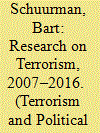| Srl | Item |
| 1 |
ID:
190972


|
|
|
|
|
| Summary/Abstract |
Terrorism research increased markedly after the attacks of September 11, 2001 (9/11). How has research on this subject changed in the past twenty years? I examine data on more than 6,000 academic articles on terrorism between 1970 and 2019, and the more than 1,500 authors of multiple articles. This information comes from every article in the Web of Science database with “terrorism” or “terrorist” in the title. Several primary findings emerge. (1) The volume of terrorism research surged to record highs after 9/11, and has not decreased since. (2) Psychologists became the most numerous terrorism researchers after 9/11, displacing political scientists for about ten years. Research on health or medical aspects of terrorism jumped after 9/11. (3) The proportion of female scholars increased substantially after 9/11, outpacing the rise in academia generally. This is in part because scholars new to the field were often from disciplines with relatively high percentages of women, such as psychology. (4) Terrorism scholars were mostly based in North America or Western Europe before 9/11, but the number of countries with scholars publishing terrorism research expanded considerably after 2001. Overall, terrorism research has developed in many ways over the decades, but 9/11 led to fundamental changes.
|
|
|
|
|
|
|
|
|
|
|
|
|
|
|
|
| 2 |
ID:
175709


|
|
|
|
|
| Summary/Abstract |
Research on terrorism has long been criticized for its inability to overcome enduring methodological issues. These include an overreliance on secondary sources and the associated literature review methodology, a scarcity of statistical analyses, a tendency for authors to work alone rather than collaborate with colleagues, and the large number of one-time contributors to the field. However, the reviews that have brought these issues to light describe the field as it developed until 2007. This article investigates to what extent these issues have endured in the 2007–2016 period by constructing a database on all of the articles published in nine leading journals on terrorism (N = 3442). The results show that the use of primary data has increased considerably and is continuing to do so. Scholars have also begun to adapt a wider variety of data-gathering techniques, greatly diminishing the overreliance on literature reviews that was noted from the 1980s through to the early 2000s. These positive changes should not obscure enduring issues. Despite improvements, most scholars continue to work alone and most authors are one-time contributors. Overall, however, the field of terrorism studies appears to have made considerable steps towards addressing long-standing issues.
|
|
|
|
|
|
|
|
|
|
|
|
|
|
|
|